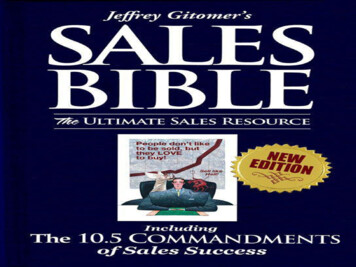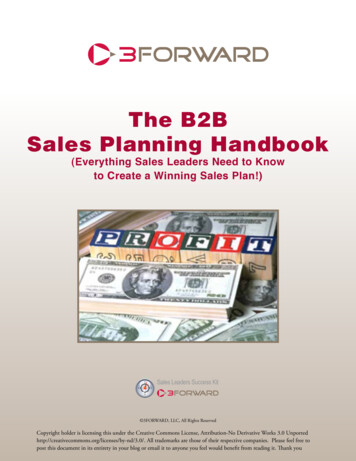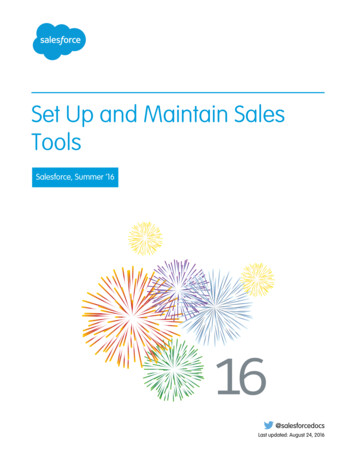
Transcription
Jeffrey Gitomer'sSalesBibleThe ULTIMATE SALES RESOURCEIncludingThe 10.5 Commandmentsof Sales Success
"Nothing happens until a sale is made."-- Red Motley, 1946"Most people aren't willing to do the hardwork it takes to make selling easy."-- Jeffrey GitomerLittle Quotes With BIG Meanings"People don't like to be sold, but they love to buy."Little Red Book of Selling by Jeffrey Gitomer
"The toughest answers in sales are the ones you have to giveyourself."Little Red Book of Sales Answers by Jeffrey Gitomer"All things being equal, people want to do business withtheir friends. All things being not quite so equal, peopleSTILL want to do business with their friends."Little Black Book of Connections by Jeffrey Gitomer"The more you talk about and ask about THEM, the morethey will like you."Little Green Book of Getting Your Way by Jeffrey Gitomer"It's your thoughts behind the words you speak that createsyour attitude."Little Gold Book of YES! Attitude by Jeffrey Gitomer
"When the customer is ready to buy, their wallet is open.Empty it."Little Platinum Book of Cha-Ching! by Jeffrey Gitomer"I want to dedicate this book and issue aspecial 'thank you' to every prospect whoever told me no."-- Jeffrey GitomerI just made a sale!You are my new customer.Thank you for your business.I appreciate your support and patronage.
With all the customers I serve through my speaking engagements, my weekly column, mye-zine Sales Caffeine, my online training business, and my writing, I have three goals:1. To help people.2. To establish long-term relationships.3. To have fun.My goal in writing this book was to make it so helpful to you that you would tell (refer) tenof your co-workers and friends to buy one. Please let me know if I reach my goal with you.Because of you, and all my other valued customers, I have the opportunity to do what I loveto do.Sell. Write. Speak. Teach.Thank You!
Jeffrey Gitomer's10.5 Commandments of Sales SuccessThe guiding principles of sales mastery1. THINK. The sale is in your head.The mindset by which you approach the sale will determine its outcome more than any otherelement of the selling process. Frame of mind and mindset. Friendly, smiley, enthusiastic,positive, confident, self-assured, likeable, and prepared beyond nervous. It's in your head,way before it's in your wallet.Ever walk into a sales call thinking to yourself, "This is not a great appointment. The sale isprobably not going to happen. And even though I'm kind of wasting my time -- what the heck,I'll give it a shot." Sure you have. Every salesperson has had that happen 100 times.You've also had the opposite happen. Walking in, thinking to yourself, "This is a greatprospect. They need my stuff, they love my stuff, and they love me. The sale is in the bag."Whichever way you walked into the call, YOU set the tone for the probable outcome. Youalso set the TONE for your attitude, your enthusiasm, and putting your belief system intomotion.
The reality is: no salesperson on the planet makes every sale. But that doesn't mean that youshould ever, ever, ever walk into a sale with anything less than a feeling of certainty that youwill make the sale because the customer needs you, and that you are the best. Not the lowestprice, but the best value.Everybody has a different way of creating his or her mindset prior to a sale. Mine hasalways been getting thoroughly ready, which includes thinking of ways to immediatelyengage the customer, and listening to rock 'n' roll music until I enter their office. In my earlydays of selling, I listened to inspirational messages.In the '70s, my two favorites were The Strangest Secret by Earl Nightingale and ThePsychology of Winning by Denis Waitley. Both messages put me in a frame of mind to thinkabout myself and pump myself up -- when, in reality, I should have been thinking about mycustomer.Over time I learned that being totally prepared in terms of the customer gave me that selfassurance, and listening to music made me feel good and gave me rhythm. Music andpreparation created mindset. I was ready, happy, and certain I was gonna make the sale. Thatis still the case today.ACTION: Before your next 100 sales appointments (yes, I said 100), write down what canhappen that's good. What you expect the positive outcome to be. And at the end of the callwrite down what you could have done to make it better.
Thinking you will is dependent on your self-confidence. Your self-confidence is based onyour preparation. Thinking you will, and letting your thoughts guide your success on aDAILY basis, will help you become PROFICIENT. This daily exercise will eventuallybecome ingrained. It has for me, and I promise it will for you -- but it must be DAILY.Thought MASTERY: The secret to mastering your thought process, and believing you canand you will, was written by Jefferson Airplane, and the immortal lyric sung by Grace Slick:"Feed your head, feed your head, feed your head."The next 9.5 commandments will lead you to the understanding of what it takes to createa relationship, and become successful -- not just make a sale. They're the core principles-- commandments -- that will form the foundation of your sales success.Each commandment is integrally linked to one another. All 10.5 must be practiced andfollowed in order for you to achieve the mastery and the results (the success and themoney) that you're hoping for. But let me assure you that it's not only possible, it'sprobable that you can achieve -- if you first think you can."I think I can. I think I can" from The Little Engine ThatCould by Watty Piper, 1930
2. BELIEVE. Develop a four-part belief system that can't be penetrated.Believe in your company, your product, and yourself -- or you won't sell.Believe the customer is better off buying what you sell, and buying it from you. Know whothe most important person in the world is. It's you!Your belief system determines your fate. Not just in the selling process, but also in yourcareer. Every seminar I've ever done, I talk about belief. Every book I've ever written talksabout belief. And yet there are thousands, maybe millions, of salespeople who don't believein anything but the money they might earn if they make a sale. As you look to succeed in yourcareer, you have to believe in the company that you represent, and you have to believe thatit's the best company in the marketplace offering or creating what you're trying to sell. Youhave to believe in their ethics. You have to believe in their ease of doing business. You haveto believe in your co-workers. And you have to believe that the company will deliver whatyou sell in a manner that will create customer loyalty.You have to believe that your products and services are not just the best in the marketplace,but that they're also the best value for the customer. You have to believe that you candifferentiate yourself from your competitor, and that you can prove (through testimonials)that your product is what you say it is.You've often heard it said that the first sale made is the salesperson - that the customer mustbuy you before they buy your company, your product, or your service. In order for this to
take place, you have to believe in yourself. In order for that sale to be made, you must firstsell yourself.That self-belief will be evident in the passion that you create in your presentation as you tryto transfer your message, engage the customer, and get them to buy from you. Your selfbelief will be evident in your enthusiasm and in your self-confidence. And that self-beliefbegins with the mindset I spoke about in commandment one. Your belief is in your head, thesame way the sale is in your head.But the glue that binds the first three elements of belief (company, product, and self) is thebelief that the customer is better off having purchased from you. That the customer's value,productivity, ease of use, profitability, and perceived win are greater with you and yourproducts and services than any competitor could ever hope to offer.ACTION: Write down the four why questions. WHY do I believe in my company? WHY doI believe in my products and services? WHY do I believe in myself? And. WHY do Ibelieve my customer is better off having purchased from me?To become belief PROFICIENT, every time you visit a customer ask them why theybelieve in you, your company and your product. Then ask them why they buy from you.To MASTER belief takes time. Developing your belief system is a combination of how youfeel, how your company executes, and how your product performs. As your history ofsuccess broadens, your entire belief system deepens. The more your customer loves you,
loves your product, and loves your company -- the more you will love to sell it, and themore sales you will make. Your customers, the ones who love you, will help you deepenyour belief system to a point that it becomes impenetrable.3. ENGAGE. Develop rapport and personal engagement, or don't start the selling(buying) conversation.Use the principle of leaning forward. Get the prospect to be interested in what you have tosay. Let the dog chase you. Engage with questions and try to make them smile, make a friend,establish some rapport, and, if at all possible, find the LINK.The customer is making a judgment on you from the moment you enter the door and begin theselling process. The old sales adage says, "All things being equal, people want to dobusiness with their friends. All things being not quite so equal, people STILL want to dobusiness with their friends." Rapport and engagement begins in a relaxed atmospherebetween or among friendly people. You cannot control how friendly the other guy will be.But you have 100% control over yourself. When you walk in the door, or the meeting starts,it's likely that you will talk first. Your words set the tone and the atmosphere for whatever isto follow. If you talk about the weather, if you talk about the news, if you talk about your flattire or your problems -- you will lose respect, you will lose all chances for rapport, and youwill lose the sale. Miserably.And it's most likely that you will leave the sale blaming its loss on everyone except theperson who lost it. That would be you.
I begin conversations, whether in person or on the phone, asking people where they live orwhere they grew up. Because I'm well traveled, it's likely that I will have something to sayor even something in common with where they live or where they grew up.I ask this question because it's engaging (people like to talk about themselves), and I ask thisquestion because it's non-threatening, and it's non-salesy. It gets the conversation going in aneasy and relaxed manner. Once I feel that I have some kind of initial rapport, I might ask,"How did you land here?" or "What made you decide to embark on this career?"Now I'm a little more personal, but still not that personal. I'm not asking about family,religion, or politics. If they bring up family, I'm more than eager to talk about it. If they bringup religion or politics, I try to get out of that conversation in under one sentence. Mypersonal rule of sales is very simple. I don't start any kind of sales conversation until I amcertain that they are ready and willing. Ready to listen, and willing to receive my message.PLEASE NOTE: The worst thing you can do is begin your meeting with your background,your company's background, or your product. If it's a big meeting, the likelihood is that yourprospective customer already knows about your company, already knows about your product-- and has probably Googled you (the same way you have Googled them).It's amazing to me how many salespeople think that they are the only ones doing researchbefore a sale. Most companies do twice as much research before they buy as a salespersonever does before they sell.
The principle of leaning forward is most easily defined in boxing. During the fight, boxerschase each other all over the ring. Jabbing and throwing punches. But occasionally, oneboxer is leaning forward as the other is throwing a punch. The term used is "walking into apunch." And the opponent immediately falls to the ground. Out cold. Your job, inestablishing rapport, is to get the customer leaning forward with a pen so that when you slidethe contract underneath it, he or she is ready to sign.ACTION: Think about your last few sales. Write down how the sale began. Was itfriendly? Did you feel comfortable when you began the sales portion of the meeting? Begineach sales call or phone call with informal, but MEANINGFUL, dialogue.PROFICIENCY: Keep a one-sentence log of how you begin each appointment. I'll bet theappointments that have turned into sales are the ones where great rapport -- even commonground -- was established.MASTER: You master personal engagement and rapport when you find common ground andlaugh together EVERY TIME you make a call or have an appointment. The measure of this isnot just making sales, it's creating relationships and friendships that end in multiple sales andreferrals.4. Discover. People buy for their reasons, not yours. Find out theirs first.This commandment could also read, People don't like to be sold, but they LOVE tobuy . The nuance of sales (that most people COMPLETELY overlook) is finding out WHY
people buy. "Why they buy" is more valuable than "how to sell." Establishing their "why" isthe basis of determining their true need(s). Their buying motive (their reasons for buying) isone billion times more important to the sale than your selling skills. Know "what you sell" interms of the customer's need to buy -- not in terms of your need to sell. They want to knowhow they can produce, profit, and succeed -- not a bunch of crap about you.People don't care what you do, unless they perceive it helps them. The way you explain yourbusiness and product determines the buying interest you create -- say it in terms of theprospect, not in terms of you.The best part about finding your customer's "reasons for buying" is that it will completelydifferentiate you from all your competitors trying to SELL.Below are some points to consider as you seek to discover the insight that will createboth urgency and orders. Here's why they buy:Their MOTIVE for buying will get you to the heart of the sale and their desire to takeaction. You determine motive by asking questions about past history, experience, wisdom,ownership, and use.Their STORY will begin to unfold as you ask motive-based questions. When you ask abouttheir experience, a story will follow. Their story will contain major clues about likes anddislikes and how to establish a real relationship.
Their PAST EXPERIENCES will lead to stories both good and bad. Your job is to listenwith the intent to understand, never interrupt, and at the end of the story ask more questions.The more questions you ask, the more information you will uncover about the next twomotives.Their EXPERTISE has been acquired from their past experience. Your job is to find outhow much of an expert they are so that you don't look like a fool trying to be an expert if thecustomer is more of an expert that you are.Their WISDOM is the final frontier of your questioning about their motives and their pastexperiences. Asking them what they've learned and asking them how they applied theirknowledge will lead you to their wisdom. When you can get to wisdom, it means you haveestablished rock-solid rapport.Their NEED will also tell you their urgency to buy, if you're able to uncover how they willuse and profit from what it is you're selling as opposed to what they're currently doing, orwhat they're currently using.Their WANT is the emotional part of the selling process. The more they want it, the morethey'll find a way to own it (just like you).Their DESIRE TO OWN is similar to their need, but has more pride attached to it. Thepride of ownership. Everyone wants to own the best. Not everyone is willing to pay for thebest. The salesperson creates the difference.
Their DESIRE TO WIN enhances the emotion of wanting and needing if the customerbelieves they will gain a competitive advantage from buying your product or service.Their DESIRE TO SOLVE OR RESOLVE present problems or situations in theircompany will also be a prime factor in purchasing urgency. The more they believe you aresome form of salvation, the faster they will purchase.Their DESIRE TO RECOVER is similar to solve or resolve but takes a longer time todecide. Recovery means some damage has been done, either physical, economic, or both.And even though they want to rebuild, their steps will be more cautious.Their PASSION is their highest form of emotion. Sales are made emotionally then justifiedlogically. The more you can uncover their passion, the more they will be willing to sharetheir passion, and the more likely the sale will be made. Especially if they see that you arealso a person of passion (belief).Their FEAR is close to their passion. Fear of loss is greater than desire to gain. Yes, theywant to beat the competition, but greater than that is their fear of losing to the competition.Once you understand this motive, you can proceed to greed.Their GREED is loosely defined as their mental process of thinking about how much theywill win by owning what you're selling. As you're talking, prospects are often doing what isknown as "mental math," or figuring out their profit in advance. I always try to let customerscalculate their own numbers. Much more powerful.
Their VANITY is important to them, even though it means pretty much nothing to you. Whenyou try something on in a store, you look at yourself in the mirror and have a thought abouthow you appear. But when the clerk comes over and says, "You look GREAT in that!"immediately your vanity kicks in and you "hafta have it."Their DESIRE TO IMPRESS carries the same weight as their vanity. Loosely referred toas "keeping up with the Joneses," it's also expressed in some form of "mine is bigger thanyours" or "mine is better than yours." I often think that America should be described as"Land of the Free, Home of the Brave, and my house is bigger than your house."Their PEACE OF MIND normally comes from knowing they have what they want, eventhough they might not use it at this moment in time. Insurance is probably the best example ofthat. Investments may be a close second. The bottom line is the more peace of mind you canprovide, the more likely you will be to convert your selling to their buying.Their DESIRED OUTCOME is a critical element, maybe the critical element in theirdecision-making process. What do they believe will happen AFTER they take ownership?How will they produce? How will they benefit? How will they profit? Are they certain theywill achieve their objectives? Are they confident in you providing the product or servicethat they're hoping for. NOTE WELL: If you get to a point where you have to sell, don't talkfeatures and benefits; talk outcomes.Their UNSPOKEN RISK is their hesitancy in moving forward. Whenever someone asks mehow to create buyer urgency, I tell him or her to remove the risk that the buyer perceives but
is not telling you. Those factors need to be explored with questions that normally begin withthe word why.Their REASONS WHY must be uncovered in order for you to get past risk. Why will they?Why won't they? Why are they hesitating? Why are they not telling me everything? The more"why" you can uncover, the more risk you can remove and the more you will get down to thereal reason. Try to find more gentle ways of asking why. For example, "What makes you."rather than "Why do you."ACTION: Take the list you have just read and see how many of the items you can relate toyou and your selling situation. Then put the best ones into action starting with your next callor appointment. See what motives you can uncover.PROFICIENCY: The moment you uncover what you believe to be a buying motive, write itdown in a file called MOTIVES. After a few months, all of them will be evident. All ofthem will be revealed. Act on them. Modify your sales presentation to include the customer'sreasons for buying.MASTERY of buying motives takes time. And motives can change with the market. Yourjob is to know them all and know the related RISKS that go along with them. Mastery ofmotives comes when you have identified unspoken risks and removed them. Risk removal isnot just mastery; it's sales mastery.5. ASK. Ask the wrong questions -- get the wrong answers.
FACT: Questions are the heart of the sale.FACT: Questions convert the selling process to a buying process.FACT: Questions uncover facts and motives for buying.FACT: Most of what is written about asking questions is wrong -- and I hope that's whatyour competition is using to learn questioning.Develop and ask questions that make the prospect think about themselves, and answer interms of you. Make them evaluate new information. Get them to give you answers in the formof information about themselves in terms of how they use, or what they think about, yourproduct or service.Your questions will reveal what they consider the value and benefit of ownership. BUTTHE QUESTIONS MUST BE INTELLIGENT. And they must be different from the onesyour competition asks, or you will be compared (unfavorably) to them. And worse, yourprospect will become bored and disengaged.Ask for their opinion often. Not only does it give you the prospect's perspective (the onlyone that matters), but it's also a great test close.And PLEASE NEVER ASK, "What's important to you?" Find out what's important by askingother questions.Ask YOURSELF questions BEFORE you ask the customer or prospect questions.
If you don't know these answers, don't go on the call.What impacts their business?How did they do last year? Or how are they doing now?How would they profit more or produce more as a result of buying andusing what you sell?What are their possible motives for buying?Who are you talking to? The decision maker or someone that has to calltheir daddy?What is their present urgency?What is their experience?I hear and read "sales gurus" that tell you what NOT to do, like don't bring brochures or asales pitch to the meeting -- TOTAL B.S. They're telling you not to be prepared for alleventualities. If you bring questions and ideas, you can drag in the kitchen sink and no onewill care.I want your prospective customer to be IMPRESSED and ENGAGED by your questions.The rest will take care of itself.ACTION: On your next sales call:
Take ten GREAT questions.Take BACKGROUND information about them.Take VALUABLE ideas they can profit from.Do that, ask the questions, create valuable dialogue, engage them, and the ultimate "take"will be yours: the order.And it STARTS with asking.PROFICIENCY: The way you question will determine the way you sell. Refine yoursevery week until their power is evident by the increase in your sales.I have always identified MASTERY of asking questions as when the prospect says, "Greatquestion. No one ever asked me that before."There is more on asking questions inside the book, but I wanted you to know how importantquestions are in converting selling to buying.6. OBSERVE. Your ability to observe must be as powerful as your ability to sell andyour ability to listen.Half the answers are there for you to see.if you're looking. Principle 12 in my Little RedBook of Selling, is "Antennas Up." It talks about being alert and open at all times so that
when an apparent opportunity arises you can take advantage of it. "Antennas Up" is PART ofyour ability to observe. Everyone (including me) has told you when you go into someone'soffice look around for clues, ideas, and conversation pieces. Trophies, pictures, anddiplomas are there for the looking. But they're also there for the thinking. The key thought is,can you relate? Or better stated, how can you relate?If someone has a bowling trophy and you're not a bowler, the best thing to do is keep quietabout it. But if someone has a Harley Davidson replica on his or her desk, and you are aHarley owner or enthusiast, then it's time to talk. Those are obvious observations, andappropriate actions.I read a short book some time ago entitled Obvious Adams: The Story of a SuccessfulBusinessman. It has been reprinted, and it is listed on the "Jeffrey's Suggested Reading List"page on www.gitomer.com. It's a story about the power of observation and afterthought, as itlinks to personal and business success. Maybe your success. Read it and see for yourself(make sure you buy the original version).Observing leads to understanding IF you're paying attention. Think about the way youobserve things now. Are you glancing at them or paying attention to them? Are you thinkingabout them as you're looking? Does what you observe create thoughts for you? Does whatyou observe create ideas for you? Does what you observe inspire you? If the answer is yesto all of those elements, then you may possess the power of observation.Merely being observant harnesses no power. Looking, thinking, generating ideas, and taking
actions as a result of your observations is the power.Observation also creates insight. It reveals the obvious things you might miss aboutsomething or someone.The good news is most people are somewhere between non-observant and oblivious. Thisgives you an immediate advantage. It always makes me feel good when I see what othersdon't, or see something that creates new thought.ACTION: Carry a small notepad and begin writing your observations as they occur. Don'tjust write what you see. Write the thoughts that strike you as a result of what you see. Yourreaction to what you see. And maybe your ideas from what you see.To become PROFICIENT at observing, the habits of writing, thinking, and idea generatingmust be consistent. Daily. Ever alert. Ever paying attention.To MASTER observation takes both daily practice and self-discipline. Sometimes atdinner, a friend or a customer will ask why I am not drinking. I respond, "Because I'm awriter and a thinker." Oh, I'll have a glass of wine every once in a while. But not twoglasses. It would ruin my power of observation and my ability to discern what I see. Youhave to choose between being a drinker or a thinker.Here's a fun exercise. Buy The Adventures of Sherlock Holmes DVDs with all theepisodes and the original characters -- Basil Rathbone and Nigel Bruce. Sherlock Holmes is
the ESSENCE of observing and thinking -- aka deducing. "Brilliant Holmes!" "Elementary,my dear Watson," the dialogue goes. Watch them all -- they are entertaining, informative,and instructional.7. DARE. Have the chutzpah to risk.Chutzpah is loosely translated into English as guts, gumption, non-conformist, moxie, andthrow in some gonads. It's a word used to admire the risk taking, or the bravado of someone."He has chutzpah," is said when speaking about the prowess or accomplishment of another -in a positive way.What is your risk factor? How willing are you to take risk in order to succeed?The word risk has to be preceded with the words "tolerance for," or the words "willing totake a." How willing you are to risk and your tolerance for risk will determine whetheryou're willing to take the risk, or accept the risk.Your personal risk might be buying a home or investing in stock. Your sales risk might be ahumorous voicemail, a creative follow up, an out-of-the-ordinary proposal, or even askingfor the sale when you're not sure what the answer will be. Risking and selling aresynonymous words.The quote I've most often used is one that's akin to, "No risk, no reward." I say, "No risk, nonothing." The reason I say it is that it provides insight into what every salesperson must
accept as the basis for a career in sales. It's a risk, and you have to be willing to take risks toearn the rewards.You often hear people say that they wouldn't or couldn't go into sales. The reason is theycan't tolerate the risk involved. The uncertainty. The unknown. Or, perhaps morefundamental, they can't handle the challenge.The reason I use the word chutzpah is because it more clearly defines the risking process fora person, and in a positive way. In a word it says go for it. Wait, that's three words. But youget the idea. It's walking out to the end of a diving board, looking down at the water tenmeters below, and not simply having the courage to dive in, but having the chutzpah to yell toeveryone around you, "Hey, watch this dive! It's my first one ever off a 10-meter board."NOTE WELL: If you've prepared well off the 5-meter board, there's a chance you could nailit. But, in any event, everyone will applaud your courage. Applaud your chutzpah.ACTION: Every day is "chutzpah day" in selling. Whether it's cold calls, face-to-faceappointments, lowering sales barriers, negotiating price, making a follow up, or asking forthe sale -- every day takes courage and application. Courage and action. Risk, and thechutzpah to take it.Start Small. Take a few low-level risks to get in the groove. A few cold calls. Not justtrying to get past the gatekeeper, but the chutzpah to get through to the decision maker, andask for a sale. Try it.
Great News: Success breeds success, AND the confidence to do more. Risk more. Askingfor the sale and making it leads to asking for more sales.More Great News: This book is FULL of ideas that require the guts to try them. The moreyou try, the more you'll succeed.PROFICIENCY REALITY: When you fail a few times, or get rejected a few times, itmakes you call on your character, your reserve, your resolve -- your chutzpah -- to try again,just a little smarter, just a little harder, and succeed.THE ONLY WAY TO MASTERY: Try an idea, a strategy, a sales idea. Try somethingnew every day. Dare yourself to succeed.8. OWN. Know whose fault it is when the sale's not made.If they turn you down because of "price," whose fault is that? If they don't return your phonecall, whose fault is that? If they decided to
In the '70s, my two favorites were The Strangest Secret by Earl Nightingale and The Psychology of Winning by Denis Waitley. Both messages put me in a frame of mind to think about myself and pump myself up -- when, i










